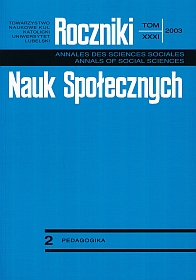Stanisława Jachowicza wychowanie do wartości – na podstawie Ćwiczeń pobożnych rozwijających myśl
Abstrakt
In the present article the meaning of `education' is discussed from the position of pedagogy of culture and the values are pointed to that are realized by Stanisław Jachowicz (1796-1857) in Ćwiczenia pobożne rozwijające myśl (1857) – the highest, most important, most valuable values, that are a perfect model for Christian education. Hence, the structural analysis of Jachowicz's selected texts and their problems are discussed and their worldview, spiritual, ethical and cognitive values are pointed to; next, the kinds of utterances and the techniques used by the writer are shown in order to pronounce the fact that he professed Christian principles and wanted his readers to become pious, good people who would propagate the good. The analytical method is mainly used, and it is complemented with the method of statistical analysis, which allows discovering more deeply Jachowicz's pedagogical thought that, in the author's opinion, belongs to the so-called pedagogy of culture.
It has been found that in the collection Jachowicz declares his adherence to the Catholic worldview and becomes its exponent and apologist. He emphasizes the greatness, omnipresence and uncommonness of God, at the same time teaching his readers to worship Him. This is done in various ways: he orders it, prays, and teaches. It has been calculated that as many as 91.5% of all the statements in the examined works worship God. Jachowicz also distinctly expresses spiritual values, such as man's contact with God; Christian virtues: faith, hope, trust, vocation and responsibility; struggle against evil; and man's participation in the salutary Passion of Redemption. Also another group is distinguished – that of ethical values (moral imperatives), like: honest work, piety, honor, respect for life, man's dignity, intellectual development, humility; as well as cognitive values containing the image of real world and man's activity, shaping the recipient's consciousness and teaching him to foresee the results of his actions and reasoning, expressing the care for human life marked with chastity, piety, unselfishness, continuously remembering about God and about eternal salvation. These values are expressed in three forms: order-appeal, prayer and direction (instruction). Also the techniques that are used and the kinds of statements have been examined in order to prove that orders having the informative-instructive, instructive, esthetic, captivating, instructive-captivating, and captivating-esthetic functions dominate. By means of them Jachowicz educates with the aim of respecting Christian values, calling for a fully happy life, united with God, for sainthood. It turns out that to this goal he also uses various kinds of prayer: adoration, request, imploration; and he utters evaluating statements – which has not been yet emphasized – as a priest with an intensive inner life.
Hopefully the present article will allow pedagogues to make the young generation consciously and more profoundly make the discussed values come true in their lives.
However, it must be added that the present article is the first result of studies on Stanisław of Dzików's literary output and it does not exhaust the issue; nevertheless the author hopes to meet the challenge in the future.
Bibliografia
Biedrzycki K.: Małgorzata Musierowicz i Borejkowie. Kraków: TAiWPN Universitas 1999.
Bilicki T.: Dziecko i wychowanie w pedagogii Jana Pawła II. Kraków: Impuls 2000.
Brezinka W.: Chrześcijańskie cele współczesnego wychowania. W: Wychowanie chrześcijańskie a kultura. Red. M. Nowak, T. Ożóg. Lublin: RW KUL 2000.
Cassier E.: Esej o człowieku. Wstęp do filozofii kultury. Warszawa: Czytelnik 1972.
Cieślikowski J.: Literatura i podkultura dziecięca. Wrocław 1975.
Encyklopedia pedagogiczna. Warszawa: Fundacja Innowacja 1997.
Głowiński M., Okopień-Sławińska A., Sławiński J.: Zarys teorii literatury. Warszawa: WSiP 1991.
Jachowicz S.: Ćwiczenia pobożne rozwijające myśl. Warszawa 1957.
Jaworski M.: Podręczna gramatyka języka polskiego. Warszawa: WSiP 1986.
Kaniowska-Lewańska I.: Stanisław Jachowicz. Życie, twórczość idziałalność. Warszawa 1986.
Kida J.: Stylistyka, styl i język artystyczny w edukacji polonistycznej. Rzeszów: Wydawnictwo Oświatowe FOSZE 1998.
Kowalik M.: Wychowanie do apostolstwa świeckich w wierszach Stanisława Jachowicza. Stalowa Wola: Oficyna Wydawnicza Fundacji Uniwersyteckiej 2003.
Kunowski S.: Podstawy współczesnej pedagogiki. Warszawa: Wydawnictwo Salezjańskie 2000.
Łobocki M.: Wartości tworzywem wychowania. W: Wychowanie chrześcijańskie a kultura. Red. M. Nowak, T. Ożóg. Lublin: RW KUL 2000.
Łoch E.: Bolesława Prusa dialog z czytelnikami. W: B. Prus. Twórczość i recepcja. Red. E. Łoch, S. Fita. Lublin: Lubelskie Towarzystwo Naukowe 1993.
Łojek M.: Przypowieści ewangeliczne w edukacji uczniów. W: Język polski wszkole średniej. Kielce 1994/95 z. 2.
Morawiec A.: Poetyka opowiadań Gustawa Herlinga-Grudzińskiego. Kraków: TAiWPN Universitas 2000.
Nawroczyński B.: Swoboda i przymus w wychowaniu. Warszawa 1924.
Nawroczyński B.: Współczesne prądy pedagogiczne. Warszawa 1947.
List Episkopatu Polski na Niedzielę Świętej Rodziny – 30 grudnia 2001. „Niedziela” 2001 nr 52 s. 12.
Nowak M.: Podstawy pedagogiki otwartej. Lublin: RW KUL 2000.
Okoń W.: Nowy słownik pedagogiczny. Warszawa: Wydawnictwo Żak 1996.
Pedagogika katolicka. Zagadnienia wybrane. Red. A. Rynio. Stalowa Wola: Filia KUL 1999.
Sawicki S.: Wartość – Sacrum – Norwid. Lublin: RW KUL 1994.
Scherer-Wirska O.: Technika nowelistyczna Marii Konopnickiej. Warszawa 1961.
Skwarczyńska S.: Wstęp do nauki o literaturze. T. II. Warszawa 1954.
Słownik teologiczny. T. 1. Katowice 1985.
Tatarkiewicz W.: O doskonałości. Lublin: IW 1991.
Waksmund R.: Poezja dla dzieci. Antologia form i tematów. Wrocław 1987.
Wołk M.: Opowiadanie i narracja w prozie pierwszoosobowej. W: Praktyki opowiadania. Red. B. Owczarek, Z. Mitosek, W. Grajewski. Kraków: TAiWPN Universitas 2001.
Wołoszyn S.: Nauki o wychowaniu w Polsce w XIX wieku. Warszawa 1993.
Ziejka F.: Stanisław Jachowicz – poeta nieznany. „Zeszyty Naukowe UJ”. Prace Historyczno-Literackie, 1976, z. 35.
Żurakowski B.: Literatura. Wartość. Dziecko. Kraków: Impuls 1999.
Żychliński A.: Rozważania filozoficzno-teologiczne [b.r.m.].
Copyright (c) 2003 Roczniki Nauk Społecznych

Utwór dostępny jest na licencji Creative Commons Uznanie autorstwa – Użycie niekomercyjne – Bez utworów zależnych 4.0 Międzynarodowe.


